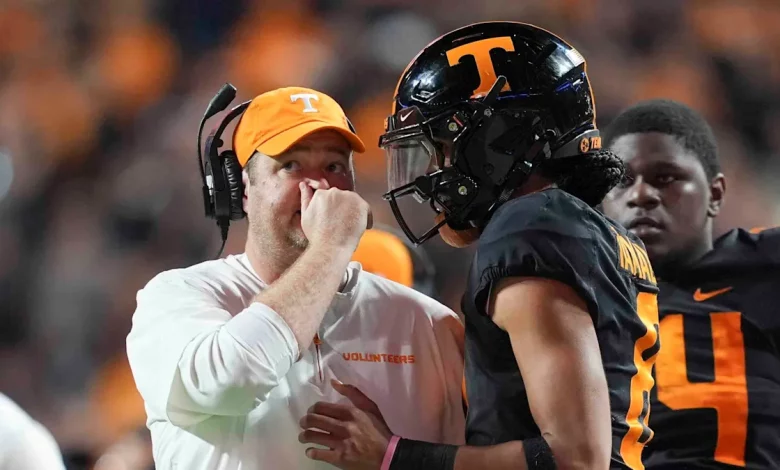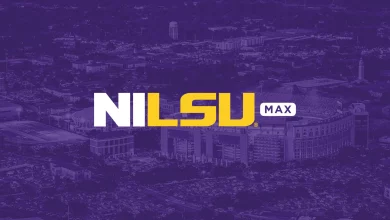The precise moment Josh Heupel realized Nico Iamaleava would be leaving Tennessee was revealed.

In the world of college football, there are moments that define seasons and careers. Coaches know how to navigate the rollercoaster of injuries, transfers, and wins and losses, but sometimes, a pivotal moment comes when a player, once thought to be a key part of the future, decides to move in a different direction. For Tennessee Volunteers head coach Josh Heupel, one such moment came on the morning of April 11, 2025, when he realized that his star quarterback, Nico Iamaleava, would be leaving the program. It wasn’t a moment of sheer shock but rather the culmination of weeks of tension, unspoken grievances, and a rapidly changing college football landscape dominated by the influence of NIL (Name, Image, and Likeness) deals.
To understand this precise moment, we need to rewind a bit and look at the buildup that led to it.
The Context: The Rise of Nico Iamaleava at Tennessee
Nico Iamaleava was never just another quarterback. He was Tennessee’s future — a highly touted prospect from California, ranked as one of the top quarterbacks in his recruiting class. Iamaleava’s commitment to Tennessee in 2023 was a milestone for the program, signaling that the Volunteers were ready to contend for national championships. Under Josh Heupel’s high-powered offense, Iamaleava would be the leader, the player to carry the torch.
In his first season with Tennessee, Iamaleava had shown why he was a coveted recruit. His performance during the 2024 season, leading the Volunteers to a 10-3 record and a College Football Playoff berth, further cemented his status as one of college football’s brightest young stars. With over 2,900 passing yards and 21 touchdowns, Iamaleava was the face of the program, and Heupel had invested a great deal of his coaching legacy in developing him.
However, with stardom came increased attention, and it wasn’t just about his football ability anymore. In an era where NIL deals were changing the college football landscape, Iamaleava’s financial future had become just as important — if not more important — than his on-field development. This shift would eventually lead to the friction that defined the relationship between Iamaleava and the Volunteers.
The Introduction of NIL Tensions
Nico Iamaleava was part of the first wave of college athletes to cash in on NIL deals. When he signed with Tennessee, he secured an $8 million NIL contract through the university’s donor collective, Spyre Sports. At the time, it was an unprecedented deal for a college freshman. Iamaleava was not only a talented quarterback but also a commercial asset, and the deal was a reflection of that.
But as 2025 approached, the NIL landscape had shifted. Veteran quarterbacks across the country were commanding even larger NIL deals. Iamaleava, now a star in college football, saw this as an opportunity to renegotiate. He was no longer a freshman who needed to prove himself — he was a proven talent, and he believed that his compensation should reflect that. Reports indicated that Iamaleava wanted to renegotiate his NIL deal, requesting an annual $4 million instead of the original $2 million per year.
This wasn’t just about money. This was a statement. A reflection of the changing dynamics of college football, where players increasingly had the power to negotiate their futures, and not just with their performances on the field but with the value they brought to their universities off of it.
For Heupel, this request was a delicate matter. While the financial side of the game had always been present, the arrival of NIL brought a new, somewhat unpredictable element to the world of recruiting and coaching. Coaches were now managing players who were not just athletes, but businesspeople with financial stakes. It was a dynamic that many, including Heupel, were still adjusting to.
The First Signs of Trouble
Tensions had been building for weeks. As Iamaleava continued to push for more money and more autonomy in his relationship with the program, Heupel found himself at a crossroads. Heupel had always been clear about his values — loyalty, commitment, and team-first mentality. However, NIL had introduced a new layer to these values, one that blurred the lines between player and program.
Rumors swirled that Iamaleava was unhappy with the terms of his current NIL deal. His frustration began to manifest in other ways — subtle, but telling. He became more distant with coaches, more private about his dealings with the collective, and his communication with Heupel became strained. But despite these signs, Heupel held out hope that the relationship could be salvaged. Heupel, ever the optimist, believed that as the offseason progressed, Iamaleava would come back around.
But then came Friday, April 11, 2025.
The Exact Moment Heupel Realized Nico Was Leaving
On that Friday morning, Josh Heupel woke up with the hope that it would be a typical spring practice day — a chance to prepare his team for the upcoming season and solidify the foundation of his offense. But as the morning wore on, something didn’t feel right. Iamaleava had not reported to the team’s morning meetings. No one had heard from him. His absence wasn’t something that could be explained away as a missed meeting or personal issue; it was different. It was the culmination of days — maybe even weeks — of neglecting to communicate, failing to show up for team obligations, and leaving Heupel in the dark.
Heupel tried to reach out to Iamaleava. His calls went unanswered. Text messages were left unread. The quarterback, who had been at the center of Tennessee’s plans for the future, had suddenly become unreachable. The silence was deafening. It was then that Heupel came to the painful realization: Nico Iamaleava was no longer committed to Tennessee. It wasn’t just a matter of missing one practice or a few meetings; it was the breaking point. It was the moment when Heupel understood that his quarterback — the face of his program — was preparing to move on.
While Heupel’s initial reaction was one of disbelief, it quickly turned to clarity. Iamaleava was not simply opting to leave because of a lack of playing time or personal grievances with coaching. No, this was a decision driven by financial and personal ambitions, fueled by the increasingly complex and often conflicting forces within the world of NIL. Iamaleava was making a choice not just to leave Tennessee, but to assert control over his future in a way that was new, bold, and perhaps even unprecedented.
The Aftermath and Heupel’s Response
By the time Friday afternoon arrived, Tennessee made the announcement. Iamaleava was no longer a part of the team. Heupel, though disappointed, knew that the program could not wait around for a player who wasn’t all in. There was too much at stake. The timing was unfortunate, with the spring game just around the corner, but Heupel remained resolute in his belief that the program would move forward.
Heupel also knew that this situation would have a ripple effect. It wasn’t just about one player. It was about the future of college football and the growing influence of NIL deals. The implications of Iamaleava’s departure would be felt throughout the sport, especially at Tennessee, where they had staked so much on his potential.
The Volunteers would have to adjust quickly. Without Iamaleava, they were left with Jake Merklinger, a redshirt freshman, and George MacIntyre, a true freshman. Heupel, however, was pragmatic. He knew that recruiting didn’t stop just because one player left. And so, he immediately began exploring the transfer portal, looking for a quarterback who could step into the void that Iamaleava had left.









